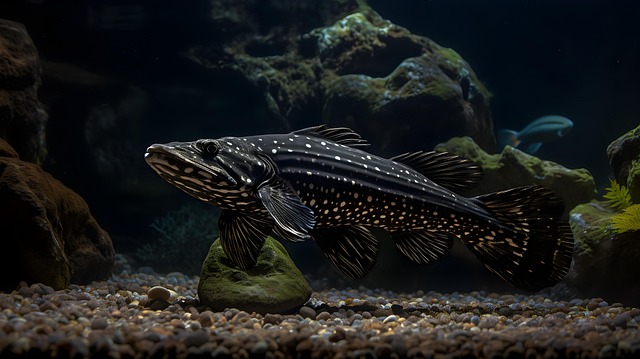The global trend towards sustainable living is driving the popularity of eco-conscious themed aquariums. These innovative designs use natural processes, renewable energy, and sustainable materials, along with advanced techniques like biomanipulation and water recycling to minimize environmental impact. Themed aquariums offer stunning visuals while educating visitors about ocean ecosystems, blending art and conservation efforts. With community engagement through workshops, cleanups, and educational programs, these aquariums inspire local residents to protect marine biodiversity and foster sustainable practices.
In today’s eco-conscious world, specialty aquariums are evolving to become more sustainable and harmonious with our natural environments. The rise of eco-friendly aquarium design incorporates creative themes, innovative green technologies, and community engagement to foster a love for marine life without damaging ecosystems. This article explores these trends, highlighting how themed aquariums can both educate and inspire while minimizing their ecological footprint. Discover the future of aquatic spaces where art, science, and sustainability merge seamlessly.
The Rise of Eco-Friendly Aquarium Design
In recent years, there’s been a significant shift towards sustainable and eco-conscious specialty aquariums, reflecting a broader global trend in embracing environmental stewardship. The rise of eco-friendly aquarium design is driven by a growing awareness of the environmental impact of traditional aquariums, which often rely on energy-intensive systems and materials with high ecological footprints. As consumers become more conscious, they seek out themed aquariums that not only offer visual splendor but also prioritize sustainability.
This shift is evident in the development of innovative designs that harness natural processes, utilize renewable energy sources, and incorporate sustainable materials. Themed aquariums are now incorporating elements like biomanipulation, where aquatic ecosystems are carefully balanced to minimize resource consumption, and water recycling systems that reduce waste. These advancements cater to the desire for aesthetically pleasing displays while promoting environmental responsibility, marking a promising future for the aquarium industry.
Creative Themes for Sustainable Marine Environments
Aquarium enthusiasts are increasingly embracing creative themes to design sustainable marine environments that reflect their unique personalities and ecological consciousness. Themed aquariums allow for a more immersive experience while promoting awareness about various ocean ecosystems. For instance, a coral reef theme can showcase the vibrant diversity of coral species, highlighting the need for conservation efforts. Alternatively, a deep-sea exploration theme may feature bioluminescent organisms, encouraging discussions on the mysteries and fragility of the deep ocean.
Incorporating these themes extends beyond aesthetics; it involves careful selection of plants, animals, and decor to mimic natural habitats while ensuring efficient water circulation and filtration. This approach not only creates captivating displays but also educates viewers about biodiversity, marine geography, and the importance of preserving these delicate ecosystems. Themed aquariums thus offer a harmonious blend of art and conservation, inspiring both admiration for nature’s wonders and a stronger commitment to sustainability.
Green Technologies Shaping Aquatic Spaces
The realm of specialty aquariums is undergoing a quiet revolution, driven by green technologies that are transforming aquatic spaces into vibrant, eco-friendly exhibits. From solar-powered filtration systems to recirculating aquariums, these innovations minimize waste and energy consumption, setting new standards for sustainability in themed aquariums. By adopting such practices, aquarium designers and operators can create stunning underwater landscapes while preserving the planet’s precious resources.
This shift towards sustainability is not just about practical considerations; it also enhances the visitor experience by fostering a deeper connection with marine life. Themed aquariums that prioritize green technologies offer unique opportunities for education and inspiration, encouraging folks to appreciate and protect diverse aquatic ecosystems. As these eco-conscious practices become more widespread, we can expect even more remarkable aquatic spaces that beautifully merge art, science, and environmental stewardship.
Community Engagement in Eco-Conscious Aquariums
Community engagement plays a pivotal role in the success and impact of sustainable, eco-conscious specialty aquariums. These institutions become more than just displays of marine life; they transform into educational hubs that foster environmental awareness. By hosting interactive workshops, community cleanups, and school field trips, themed aquariums can inspire local residents to take active roles in protecting ocean ecosystems. Engaging the public through these initiatives not only promotes a deeper understanding of marine conservation but also creates a sense of collective responsibility for our shared aquatic resources.
Furthermore, community engagement strategies enable specialty aquariums to build strong connections with nearby neighborhoods, turning them into integral parts of local communities. This collaboration can lead to innovative co-creation of exhibits and programs that resonate with diverse audiences. By leveraging the power of community involvement, eco-conscious aquariums can move beyond individual visitor experiences, contributing significantly to global efforts to preserve marine biodiversity and promote sustainable practices.
The future of aquatic entertainment lies in sustainable and eco-conscious specialty aquariums. By embracing creative themes, integrating green technologies, and fostering community engagement, these aquariums not only provide stunning visual experiences but also contribute to environmental conservation. The rise of eco-friendly aquarium design demonstrates a shift towards a greener world, where themed aquariums can be both captivating and responsible stewards of our oceans.
